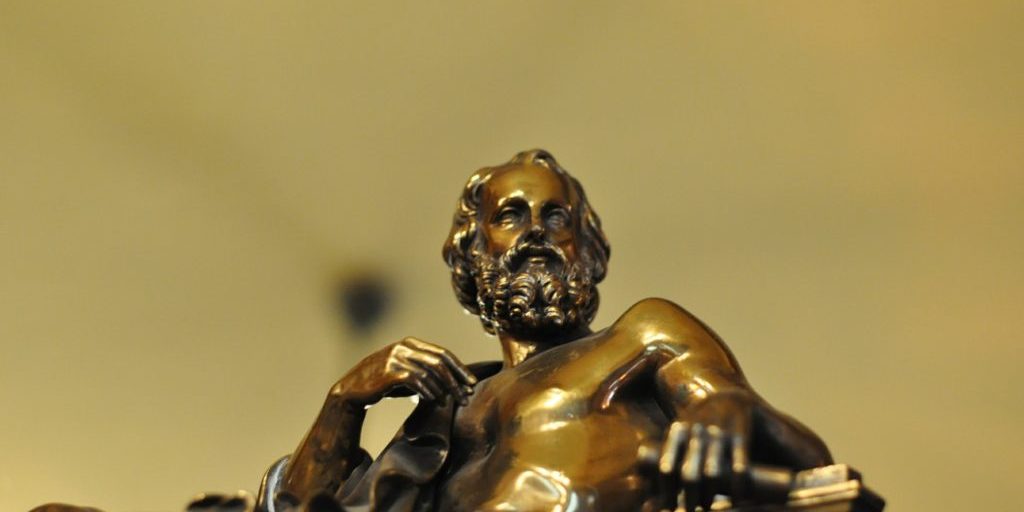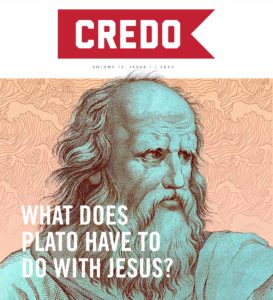
Why We Still Need Plato
The latest issue of C redo Magazine focuses on Christian Platonism. The following is one of the issue’s featured articles by Louis Markos. Dr. Markos is Professor in English and Scholar in Residence at Houston Baptist University.
redo Magazine focuses on Christian Platonism. The following is one of the issue’s featured articles by Louis Markos. Dr. Markos is Professor in English and Scholar in Residence at Houston Baptist University.
Along with a growing number of my fellow evangelicals, I have learned to qualify the Reformation cry of sola scriptura (distinguishing it from solo scriptura) by asserting the foundational authority of the ecumenical councils that formed the creeds. I have learned too to drink deeply at the patristic well: not raising Sacred Tradition to the same level as the Bible but according a greater weight of authority to the sermons and treatises of Church Fathers from Irenaeus to Athanasius to Chrysostom to Augustine than some who ignore their wisdom. Though it is probably too early to speak of an official Protestant Resourcement, I have been cheered by the enthusiasm with which evangelical colleges, presses, and scholars have reconnected with our ancient Christian heritage. And that reconnection has been taking place as well in the more theologically orthodox sectors of the mainline.
This Protestant rehabilitation of the Fathers of the Church is, I believe, a good and healthy thing that promises to strengthen the body of Christ and to build a much-needed bulwark around the central doctrines of the faith. Nevertheless, despite these promising signs, I sense a subtle but pervasive danger in this movement that could compromise and even pervert the very good it hopes to accomplish. For the last two centuries, theological liberals have made an art of blaming St. Paul for all those aspects of Christianity that they find distasteful or anti-modern. In parallel fashion, many neo-orthodox Protestants have been far too eager to blame Plato for what they don’t like in the Early Church.The point at issue is not whether Plato was a Christian, but whether or not he was a pre-Christian and a proto-Christian, one whom God used to prepare the pagan world for the coming of Christ. Click To Tweet
Now it must be admitted at the outset that any Christian, ancient or modern, who would learn from Plato must do so with caution and discernment. The gnostic Neo-Platonists harbored a low view of the body and of the physical world in general that is incompatible not only with the Incarnation and Resurrection of Christ but with our own status as enfleshed souls. Plato was too quick to view human beings as souls trapped inside of bodies, and the Gnostics who followed him were unwilling to accept that the Word truly and fully became flesh. Christ, they believed, only appeared to be a man; he merely wore the flesh as a man might wear a shirt that he later discards. Our imperfect physical world of becoming, Plato taught, is but a shadow or imitation of the perfect spiritual world of the Forms. For the Greek Plato, the notion that a perfect God would take on flesh and become a man was the height of foolishness.
In sum, Platonic philosophy in its purest form renders not only the Incarnation of Christ but the incarnational nature of man an absurdity. But then no orthodox Christian apologist for Plato would advocate a simple acceptance of Platonism. The point at issue is not whether Plato was a Christian (of course he wasn’t), but whether or not he was a pre-Christian who got many things partially right that would later be revealed in their fullness in Christ someone God used to prepare the pagan world for the coming of Christ. Though only the Gospel of John could teach pre-conversion Augustine that the Word (Logos) was made flesh, he did learn from such Neo-Platonists as Plotinus—so he tells us in his Confessions—that the Word was with God and was God. God, that is to say, prepared Augustine’s heart for the truth of the Incarnation (Word made Flesh) by first opening his mind, via the Neo-Platonists, to the possibility that the Word existed and was with God. Augustine the convert surely remembered the vital role that Plato’s teachings played in his spiritual journey, for when he matured into Augustine the philosopher and theologian, he did not dismiss Plato’s theory of the Forms as a satanic deception, but placed those Forms (correctly, I believe) in the Mind of God.
Augustine consciously reworks Plato in his writings. The Platonic vision that appears in Hebrews, in contrast, seems to be totally unconscious. The author of Hebrews writes and argues within a Hebraic, rather than Hellenic, context, and yet Hebrews 9 works out a distinction between the heavenly and earthly Temple that reads like a passage out of Plato. According to verses 23 and 24, the Most Holy Place, where dwelt the Ark of the Covenant, is but a copy or imitation of the eternal Temple which is in heaven. The temporal, imperfect blood sacrifices of the Old Testament were performed to cleanse the copies, but only the eternal, perfect sacrifice of Christ could sanctify the original sanctuary which is the Throne Room of God. The author of Hebrews is not reworking Plato’s Theory of the Forms (as Augustine is), but revealing a great truth that Plato the pre-Christian somehow managed to catch sight of. Though Plato most likely did not glimpse the Throne Room directly (as the prophets do in Isaiah 6, Ezekiel 1, and Revelation 4), he did glimpse the truth behind it—that the things of our world are, in comparison to heaven, mere phantoms and shadows.
And it is with that assertion of the relative insubstantiality of our world that I shall begin my list of four reasons why Protestant, and to a lesser extent Catholic and Orthodox, Christians still need Plato today.
Reason #1
Yes, and twice and thrice yes, our world is real and substantial. It was made good by God the Creator—not poorly and by a lesser God as the Gnostics and Neo-Platonists believed—and it will be redeemed when Christ returns. Still, in comparison to the Absolute Reality of heaven, our world is a rather thin and murky affair. That is why at the end of The Last Battle (the final novel of the Chronicles of Narnia) the highly orthodox and highly Platonic C. S. Lewis refers to our present world as the “Shadow-lands.” When Jesus tells his would-be followers that they must hate their fathers and mothers (Luke 14:26), he does not mean we should literally to hate them; rather, in comparison to our absolute love for and allegiance to God, our feelings to our parents will seem almost to be hatred (see Matthew 10:37, where the intent of Jesus’ hyperbolic language is made clear).We need Plato to help us put things back into their proper perspective. Click To Tweet
Lewis complains in Miracles that our modern world is given to speaking of God and heaven in negative terms. We are corporeal, bodily; God is non-corporeal and non-bodily. Earth is substantial and physical; heaven is insubstantial and non-physical. If anything, Lewis argues, God and heaven are trans-corporeal and trans-physical. God is not less than man, but more. Heaven is not earth with all the “stuff” taken out, but a reality that transcends and surpasses our own as the original transcends the copy or the substance surpasses the shadow. Despite the influence of The Da Vinci Code and the Gnostic Gospels, the characteristic sin of our modern age is not to make the earth nothing, but to make it everything. We need Plato to help us put things back into their proper perspective.

